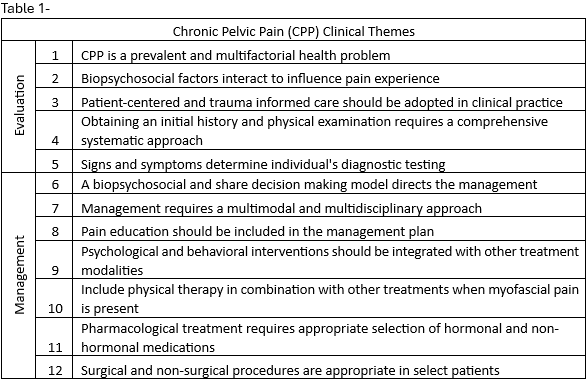Clinical Foundations for Abdomino-Pelvic Pain Evaluation and Management Curriculum

CLINICAL FOUNDATIONS COURSE FOR ABDOMINO-PELVIC PAIN EVALUATION AND MANAGEMENT
INTRODUCTION
Chronic pelvic pain is a significant global health issue. Access to high-quality, well-organized educational resources for healthcare professionals on the evaluation and management of chronic pelvic pain (CPP) remains limited. For years, the International Pelvic Pain Society's Clinical Foundations Course has served as a cornerstone for many healthcare professionals who assist patients suffering from CPP.
This asynchronous hybrid curriculum, designed with adult learning principles in mind, provides you with the essential tools to effectively evaluate and manage patients with these conditions. The curriculum is anchored in "clinical themes" derived from current and up-to-date clinical guidelines on CPP evaluation and management, as published by Castellanos et al. (Table 1).
By completing this course, you will not only enhance your knowledge and experience in CPP management but also fulfill one of the requirements for the Pelvic Pain Specialty Designation (PPSD). This course will also prepare you for the PPSD assessment, another crucial step towards this designation and has the potential of connecting you with potential mentors and supporters of your application.
OBJECTIVES
1. Discuss general principles for the evaluation and management of abdomino pelvic pain patients.
2. Review up to date pathophysiologic mechanisms of pain and different conditions leading to pelvic pain.
3. Demonstrate how to carry an initial assessment for those with abdomino pelvic pain.
4. Identify symptoms, signs and physical exam findings suggestive of conditions leading to abdomino pelvic pain.
5. Employ a biopsychosocial approach when evaluating and treating patient with abdomino pelvic pain.
6. Explain the importance of a shared decision model and a trauma informed care approach.
7. List different strategies (noninvasive and invasive) to implement when delivering a multidisciplinary care approach to those suffering from abdomino pelvic pain conditions.

Jorge CarrilloMD

Mark DasselMD

Alexandra MilspawPhD, MEd

Janelle MoulderMD, MSCR, FACS, FACOG

Corey HazamaDPT, OCS, CFMT, PRPC

Eva ReinaMD
TEACHING LEARNING MATERIAL & ACTIVITIES
- 20 asynchronous videos in lecture format. See below for the topic of each video.
- Reading material: 2-3 references per lecture to prepare for each topic.
- An “Action plan” for each lecture with small feasible clinical tasks to be performed on a day-to-day practice.
- 2 virtual sessions to discuss with faculty and solve questions (twice during the study period).
- Access to the IPPS Mentorship program.
- Online interactive case-based activity with all Faculty at the end of the curriculum.
Reference:
Castellanos, M. E., Carrillo, J. F., Green, I., Milspaw, A., & Lamvu, G. (2024). Identifying Gaps in Pelvic Pain Education: A Scoping Review and Structured Analysis of Obstetrics and Gynecology Training Milestones. Journal of minimally invasive gynecology, 31(3), 180–192. https://doi.org/10.1016/j.jmig.2023.12.002
ASSESSMENTS
- Pre- and post-video assessment with multiple choice questions – questions will come with 2-3 references provided as reading material for corresponding the virtual session.
- Final assessment utilizing a MCQ assessment to prepare for the PPSD assessment.
LIVE SESSIONS
August 4, 2025: Welcome and Introduction - Speakers: Jorge Carrillo, MD and Mark Dassel MD
October 6, 10 AM EST: Q&A #1 (recorded and shared)
October 7, 8 PM EST: Q&A #2 (recorded and shared)
December 6, 2025: Live Case Review / Conclusion - All Faculty
VIDEOS
1. Persistent Pelvic Pain 101. Speaker: Jorge Carrillo, MD (1) 20 mins
2. Pain Pathophysiology Unraveled. Speaker: Janelle Moulder, MD (2) - 40 mins
3. History taking simplified. Speaker: Jorge Carrillo, MD (3,4) – 30 mins
4. Anatomical basis of the physical exam. Speaker: Jorge Carrillo, MD (3,4) 45 mins
5. Physical exam (anatomy and exam). Speaker: Corey Hazama, DPT (3,4) 30 mins
6. Psychosocial assessment. Speaker: Alexandra Milspaw PhD (2,3) 20 mins
7. Gynecology – Dysmenorrhea, Endometriosis. Speaker: Eva Reina, MD (5,6,8) 45 mins
8. Gynecology – PCS and Ov remnant Eva Reina, MD (5,6,8) 20 mins
9. Urology. Speaker: Mark Dassel, MD (5,6,8) 30 mins
10. Gastrointestinal. Speaker: Janelle Moulder, MD (5,6,8) 25 mins
11. Neuralgias. Speaker: Jorge Carrillo, MD (5,6,8) 30 mins
12. Sexual Pain. Speaker: Mark Dassel, MD (5,6,8) 45 mins
13. Abdominopelvic Adhesions – Mark Dassel , MD (5,6,8) 30 mins
14. Expanding frontiers in pelvic pain. Speaker: Janelle Moulder, MD (5,6,8) 20 mins
15. The A Team. Speaker: Alexandra Milspaw, PhD (6,7,8) 15 mins
16. Role of patient education in the management of CPP. Speaker: Jorge Carrillo, MD, (8) 30 mins
17. MSK Therapies. Speaker: Corey Hazama, DPT (6,8) 30 mins
18. Medical Therapies. Speaker: Eva Reina, MD MD (6,8,10) 30 mins
19. Interventional Therapies. Speaker: Jorge Carrillo, MD, (6,8,11) 30 mins
20. Behavioral Approaches in Persistent Pelvic Pain. Speaker: Alexandra Milspaw, PhD (6,8,9) 60 mins
See Table 1 for the correlated clinical themes.
FINAL EXAM: Sent out at the end of the course – active for 2-weeks.

IPPS Member | Member Price | Non-Member | Non-Member Price |
|---|---|---|---|
Physician Member | $575.00 | Physician | $675.00 |
Non-Physician/Healthcare Professional | $525.00 | Non-Physician/Healthcare Professional | $625.00 |
Advocate Member | $200.00 | Fellow (must provide Department documentation) | $150.00 |
Fellow (must provide Department documentation) | $100.00 | Resident/Student (must provide Department documentation) | $150.00 |
Resident/Student (must provide Department documentation) | $100.00 | ||
The Justice, Equity, Diversity, and Inclusion (JEDI) Scholarship is available for those that may qualify. To learn more CLICK HERE!
How To Register
If you are from one of the following countries*, follow the steps below: United States, Canada, Argentina, Austria, Australia, Bahamas, Belgium, Brazil, Colombia, Costa Rica, Cyprus, Czech Republic, Dominican Republic, Ecuador, El Salvador, France, Germany, Greece, Honduras, Hong Kong, or India.
*If your country is not listed above, please register using the following link: MY COUNTRY IS NOT LISTED ABOVE
Step 1
Click 'Register Now'.
You will be taken to a separate page within Zoom Events.
Step 2
Click 'Register'.
Sign in to Zoom (using your personal Zoom account email and password). If you do not have an account - please click here to create one.
Step 3
Choose the ticket which applies to you.
Click 'Continue'.
Step 4
Review your order and enter your information.
Click 'Agree and continue' to purchase your ticket.

